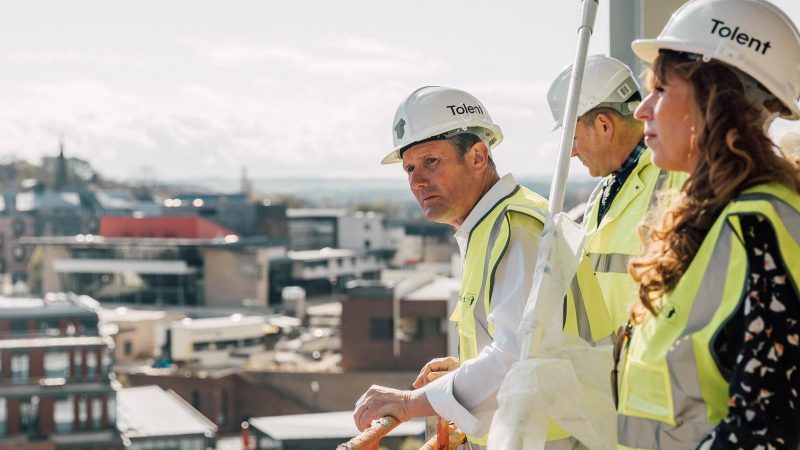
“There will come a point at which the road will run out for Johnson,” Keir Starmer told ITV’s Robert Peston earlier this year. The Prime Minister, he said, would call an early election “before all of his broken promises catch up with him”.
Even trickster and showman Boris Johnson cannot run from accountability forever, Starmer implied. In ‘Red Wall’ seats in particular, Labour voters – for that’s what they really are – will eventually see that Johnson does not truly have their interests at heart.
Ask many in the Labour Party and they would agree with this characterisation. It suggests, ultimately, that Labour simply has to wait and the public will, eventually, come round to the party’s way of thinking and see Boris Johnson as an obvious aberration.
The assumption is that, after being rejected four times in a row, it is still voters who are in the wrong place, not the party. This thinking is a recipe for yet another electoral disaster, as the Hartlepool by-election made all too clear.
Labour has been saying ‘there will come a point’ for a very long time. Remember, there would come a point when voters saw the damage of austerity and the Conservatives would get their comeuppance. There would come a point when voters saw the folly of Brexit and chuck the Conservatives out of office. There would come a point when voters would see the Conservatives had mishandled the pandemic and their support would collapse. This is a perpetual cycle of delusion and complacency.
That magical point may come before the next election that Johnson is ‘found out’. But it is a political gamble that Labour has taken for over a decade now to no avail. And if public opinion moves, as Starmer insists it will, the Conservatives will surely move with it.
A striking difference between the two main parties is that while the Conservatives tend to move towards the public, even if it challenges core party principles, Labour expects the public to come to them.
None of this is to suggest that Johnson, or the Conservatives, are wildly popular. A YouGov poll in late October put Johnson’s approval ratings at their lowest since the general election. Another recent YouGov poll showed government disapproval back at its highest during this parliament. But few governments are popular after their first year in office, and Labour remains consistently behind nonetheless.
This goes to show that politics is an unpopularity contest. While the public distrusts Labour more than the Conservatives, the latter are let off the hook. Labour should recognise that, if the Conservatives are ‘getting away with it’, the opposition party bears a large share of the responsibility for not providing a credible alternative.
Labour has still not learned the lessons of 2010, when the current rut began. A post-election report by Lord Ashcroft, ‘What Future for Labour?’, speaking to voters who deserted Labour in 2010, revealed findings that the party ought to have internalised over a decade ago.
Labour was not trusted by these voters on the economy. They thought the party was distracted by infighting. They felt it was out of touch with most people’s real concerns. They thought it was too generous on welfare. And they did not trust the party to reduce immigration.
It is hard to believe that in the last 11 years Labour has done much to change these perceptions. In fact, it has almost certainly made them worse. But it is these old, and by now deeply embedded, perceptions that Labour has to shift to win.
To its credit, the shadow Treasury team have taken trust on the economy very seriously, pledging not to borrow for day-to-day spending and to bring down overall debt. Starmer, too, has said the party’s focus will be on reprioritising spending, not substantially increasing it.
Starmer has also begun to reorient the party away from itself and towards the public, for which he deserves a lot of credit. There are also signs that the public has moved towards Labour on welfare and there is increasingly room for more nuance in the immigration debate. But Labour needs to do much more across the board. Voters need to know unequivocally that Labour has changed, not suspect that it has done so.
Renaissance, a group set up to reconnect Labour with the voters it lost in 2019, has recently published some good ideas about where to start. Their conversations with former Labour voters reveal a common theme to frame Labour’s approach: security – secure work, secure public finances, secure communities and a secure Britain in the world.
As a platform, this is a far cry from the wild spending pledges of the 2019 manifesto, and a leader who failed to condemn the Kremlin directly after the Salisbury poisonings and was sceptical of, if not hostile to, trident and NATO.
In his victory speech after winning the Conservative leadership in 2005, David Cameron pledged to revamp his party from top to bottom. What other conclusion could you reach about what was needed after three consecutive election defeats?
Labour has now had four consecutive defeats – the last the most damning of all. Yet the party still appears to be relying on voters to change, not itself. This is a strategy that has already been tested to destruction. It would be beyond foolish to repeat it.




More from LabourList
‘Factionalism at the top is weakening Labour – and handing a gift to Reform’
‘Europe must stand strong on its own as US security guarantees grow conditional’
‘Tackling poverty should be the legacy of Keir Starmer’s government’